 With Space: Above and Beyond, creators Glen Morgan and James Wong
wanted to harken back to the heroic optimism expressed in classic World
War II films of the '40s and '50s. Grafting a science fiction framework
onto their premise afforded an opportunity to explore the venerable themes
of those films - not to mention a literature dating back to The Iliad,
from whose tradition these movies sprung.
With Space: Above and Beyond, creators Glen Morgan and James Wong
wanted to harken back to the heroic optimism expressed in classic World
War II films of the '40s and '50s. Grafting a science fiction framework
onto their premise afforded an opportunity to explore the venerable themes
of those films - not to mention a literature dating back to The Iliad,
from whose tradition these movies sprung.  By putting the fiction first, this science fiction series was the
best new genre offering this season, perhaps the best new drama in any genre.
Ironically, the only other contender, Steven Bochco's Murder One,
also spent the season struggling with ratings following a disastrous scheduling
decision by network programmers.
By putting the fiction first, this science fiction series was the
best new genre offering this season, perhaps the best new drama in any genre.
Ironically, the only other contender, Steven Bochco's Murder One,
also spent the season struggling with ratings following a disastrous scheduling
decision by network programmers. 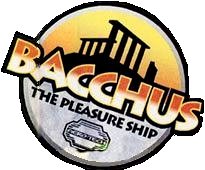
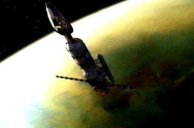 Pilot
Pilot



Written by Glen Morgan and James Wong
Directed by David Nutter
Airdate 9/24/95
The problem with pilots, especially for science fiction shows, is that an entirely new universe has to be established within their confines. Add to that other elements like the show's premise, situations and conflicts, and you have very little time left over to examine the characters. Unfortunately, it's primarily the appeal of those characters which will lure viewers back to their televisions week after week.
This initial two-hour outing falls into this nearly unavoidable trap. The good news is that the universe of Space is compelling enough to bring viewers back on its own merits, so the characters can then shine in subsequent installments.
Morgan and Wong set the series in the year 2063, one hundred years after the assassination of President John F. Kennedy. An alien attack on the Earth colony Vesta viscerally shocks our planet with an intensity matching that event, and suddenly a group of Marines are fighting a war they believed could never happen. The pilot traces the training of these individuals and their evolution into the 58th Squadron of the Marine's Space Aviator Cavalry.
Under the expert eye of director David Nutter and with spectacular special effects provided by Area 51, events are painted on an epic canvas. The dense plotting gives the story a gravity that stands on its own merits, beyond merely being a set-up for the series to follow. It's one of the few science fiction pilots that could easily stand on its own as a feature film.
The enormous physical production for the pilot was done in Queensland, Australia. At the time, the intention was to lens the entire series there as well. Los Angeles was eventually chosen instead, but the producers' initial indecision led them into some brick walls while casting the pilot.
"Nobody wanted to film in Australia," says co-creator and executive producer James Wong. "When we started casting, we told everyone that there was a possibility we'd be shooting in Australia, so if you don't want to do that, don't even bother to come in. And a lot of people passed because of that, and of course, we ended up shooting here."
All of the series' characters were still relatively unformed in the pilot, but perhaps none evolved more unexpectedly than Rodney Rowland's Cooper Hawkes. Three episodes into the series, the actor discovered his character, an artificially bred in vitro, was actually only a few years old. "That information altered things greatly," says Rowland. "You go look at the pilot, and I'm playing a 24-year-old. And all of a sudden, I learn he's a baby in the third episode. He was very cool, very macho in the pilot, and suddenly I had to find his innocence."
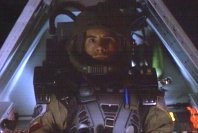 The Farthest
Man From Home
The Farthest
Man From Home

Written by Glen Morgan and James Wong
Directed by David Nutter
Airdate 10/1/95
Nathan goes AWOL when he learns his fiancee, Kylen, may be among a handful of survivors on the Tellus Colony. Reluctantly, Vansen and Hawkes follow, as West discovers that Kylen did indeed survive the attack and is now a prisoner of the Chigs.
This episode also introduces two recurring characters: Tucker Smallwood as Commodore Ross, who will become an unofficial regular on the series, and Michael Mantell as Howard Sewell, the AeroTech agent of conspiracy.
The chief problem with this episode is the unsympathetic light in which it places West. For Morgan and Wong to have their lead character put his squadron in danger in order to pursue an essentially selfish errand in the first regular episode of the series is a crucial mistake. The character will spend most of the season atoning for this sin in the minds of the series' viewers.
While actor Morgan Weisser was uncomfortable with West's "whiny, wimpy" personality traits, he was glad to see that the show wasn't going to avoid gritty conflict among its regulars. "I wasn't real happy with the pilot," he says. "I don't feel any of us were. I think the pilot was more about the special effects, more of a glossy Top Gun kind of showcase. Once the episodes started, though, I think the studio was surprised that we were doing more realistic, gritty stories and taking our characters in interesting places, and I've been really happy with where we've gone since this episode."
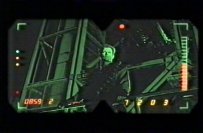 The Dark Side
of the Sun
The Dark Side
of the Sun

Written by Glen Morgan and James Wong
Directed by Charles Martin Smith
Airdate 10/8/95
On an asteroid where crucial fuel ore is being mined by a group of mercenary Silicates, Shane must lead the 58th in stopping them, while at the same time seeking information about her parents' murder years earlier at the hands of the Silicates.
In each of these first three episodes, Morgan and Wong offer different lead character his or her fondest wish, then twist it into a temptation that tests the character's loyalty to the 58th. The success in this episode lies in Morgan and Wong's nuanced writing for Vansen, and in Kristen Cloke's realization of the character.
Rarely in television (and almost nowhere else in science fiction - including Star Trek) is a woman shown to be as effective a leader while being as innately feminine as is Shane Vansen.
Cloke refuses to distinguish between Shane the woman from Vansen the Marine - instead, she allows the character's femininity to inform her actions as leader of the 58th. Her strength isn't separated from her femininity - it's drawn directly from it. "The leadership of the character is approached less like a Marine and more like a mother," she explains. "There's something about being a woman and having a maternal instinct and protecting her kids. She sees the 58th as her kids.
"I get criticism for being too hard," the actress says, shrugging. "It's a fine line to walk, but for the most part, I give credit to the writers for balancing that."
Of the episode, Cloke says, "It was hard to do it so early in the series. It was the second episode that we shot, so it was a little hard in that respect. It was incredibly emotionally trying. I think I had a nervous breakdown at least once during that episode."
Vansen's foes, the Silicates, offer the series a fresh bad guy beyond the already established Chigs. Morgan and Wong wanted to disseminate new information about the enemy very slowly, and this providing other adversaries for the 58th. Unfortunately, the artificial intelligence baddies are too one-dimensional here and their ineffective introduction in this episode undercuts their future usefulness as a recurring threat.
Note to X-Files fans: Look for a character here named after that show's co-executive producer, Howard Gordon.
 Mutiny
Mutiny


Written by Steven Zito
Directed by Steven Cragg
Airdate 10/15/95
After a Chig attack disables a cargo ship that the 58th is aboard, Cooper gets drawn into a crew mutiny over 200 cryogenically-suspended "tanks" who are deemed expendable by the ship's captain - one of them being Cooper's "sister."
Mutiny is the most effective of this initial trilogy of episodes, each one focusing on a different lead character. As a tank, Hawkes' backstory is inherently a more interesting and poignant one, and this episode also benefits from Stephen Zito's first explorations into the relationship between Hawkes and fellow tank McQueen that would become a cornerstone of the season.
Together, the actors had to explore how best to portray artificially-gestated human beings "born" at age eighteen.
Says Morrison, "Rodney and I learned about that just before 'Mutiny.' We didn't know that during the pilot, and we had to re-think some stuff. If you knew you were a natural-born human and a lawyer, you'd know certain things about your character. You'd know you went to law school. You'd know you had parents somewhere. You'd have more of a frame of reference to create a character. But on our show, it really does just involve the circumstances and the situation of that moment, and I think the ultimate goal is to bring truth to that moment."
Says Rowland, "That episode showed that the character didn't really care about war. For him, it's just about connecting to something - to his sister, to a family, to something. He feels so less-than everybody else around him.
"It's tough to look at it now," he says of his performance. "I was still so nervous. I was an entirely different actor, even that recently. I just couldn't see a scene as well. I couldn't see where a scene climaxed. I trust myself more now."
Of the evolution of McQueen/Hawkes relationship, Morrison says, "It's the great thing about the writing here. Not only are there so many ways to interpret a moment upon viewing it, but it also teases you. They'll establish something in the third episode that won't really be dealt with again until the twelfth."
 Ray Butts
Ray Butts

Written by Glen Morgan and James Wong
Directed by Charles Martin Smith
Airdate 10/22/95
The 58th is forced to join a mysterious Special Forces Commando, Raymond Butts (Steve Rankin), on a classified sabotage mission to a planet held by the Chigs.
Butts' character initially comes off as Space's equivalent of Star Trek's infamous "insane Admiral" archetype. The problem with such a figure is that he drives the action for the episode, leaving our main characters in essentially passive roles. However, the revelation that Butts has brought the 58th to this world in order to bury his dead comrades adds an element of ambiguity and pathos to both the character and the overall proceedings.
With Mutiny, and now Ray Butts, we begin to see James Morrison's Colonel McQueen move more into the forefront, taking a more active interest in the 58th's well-being and becoming more than simply the mouthpiece that gives the squadron its assignment of the week.
Accordingly, McQueen's popularity with viewers began to take off. Says the actor, "It didn't surprise me that the character became as popular as he did. I saw the potential there. In the first few episodes, they had to tie up the loose ends that the pilot had created. They had to follow Nathan's story, and Shane's story, Cooper's story. You start all these shows as a formula, because you have to, but they change, they evolve."
 Eyes
Eyes


Written by Glen Morgan and James Wong
Directed by Felix Alcala
Airdate 11/5/95
Following the assassination of the UN Secretary General, the 58th is assigned to protect the newly-appointed world leader from becoming another victim. The suspected assassin is a figure within the shadowy government agency, AeroTech.
With Eyes, Morgan and Wong visit the well-worn conspiracy arena they plumbed so successfully in The X-Files. The most interesting aspect of the episode is its diverse guest cast. Harriet Harris, who was so terrific in turns on The X-Files' Eve and as Frasier's manic agent, appears here as US Ambassador to the UN Diane Hayden. Look also for Star Trek III's Robin Curtis and for Daniel Stewart, Patrick's son, who appeared in ST:TNG's The Inner Light.
While the storyline evokes the political machinations of McCarthyism and the Cold War, its complexity and fatalism put it in opposition to Morgan and Wong's essentially optimistic framework, where motives are clean and the war we fight is just.
Following this episode, the series creators made the decision to focus on the enemy that's out there, rather than fleshing out any enemy-within uncovered in Eyes.
Says Morgan, "I think the way we were dealing with this in the beginning was too "X-File-ish." So we just kind of put all that aside."
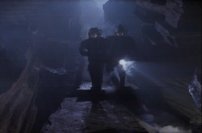 The Enemy
The Enemy


Written by Marilyn Osborn
Directed by Michael Katleman
Airdate 11/12/95
The 58th becomes the target of a kind of electronic nerve gas, designed by the Chigs, which intensifies one's greatest fears and threatens to destroy the squadron from within.
What seems at first blush to be a story steeped in science fiction cliche - a weapon that intensifies fears - is handled expertly by Marilyn Osborn, previously an X-Files freelancer. The script has scope its premise might not otherwise sustain.
Most effective: an interesting framing device that has Damphousse questioned before a board of inquiry about the 58th's actions, which are seen in flashback. This is the first look the series takes at Damphousse and Wang's characters, and indeed is the first true ensemble piece of the season.
"Jim and Glen are really involved in the storytelling process," says writer Osborn. "They had read an article in Discovery about something that somehow controls your fears. So they give you that germ, and then you ask, 'What if it's a weapon?' You go back and forth and back and forth and together we arrived at this interesting story.
"It really opened up the characters," Osborn says of the episode. "This one was supposed to shake open more of the characters and let us see more about them. It was the first step to seeing them as a group."
Morgan and Wong also got involved in devising the fears each member of the ensemble would exhibit. "Glen and Jim are the kings of fear," says Osborn. "They're the masters."
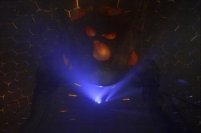 Hostile Visit
Hostile Visit


Written by Tom Towler
Directed by Thomas Wright
Airdate: 11/19/95
The 58th recovers a disabled alien bomber and uses it as a Trojan Horse in a surprise attack against the Chigs. The episode ends with the ruse discovered and the squadron shot down behind enemy lines in the series' first two-part storyline.
Hostile Visit establishes more about the Chig enemy than any episode since the pilot. It also strongly hints at a connection between the Chigs and AeroTech (represented once more by Michael Mantell as Howard Sewell).
The centerpiece of this exceptionally strong outing is the 58th's attempt to unlock the mysterious workings of the Chig technology. Unlike what's often seen in other science fiction shows, it's not just a matter of translating the language used on a control panel. The Chigs are a distinctly alien culture, and their technology satisfyingly reflects this.
Unfortunately, production designer Bernard Hides' set for the alien craft doesn't go as far as it might in depicting this alien-ness. "I was disappointed in the inside of the alien bomber," he admits. "The design was formulated, and I started to get it costed, and it was extremely prohibitive. I wanted to preserve the look that I had, so I started to eliminate pieces of it, and I got it down to just the bare bones, and I still had to justify it.
"I was disappointed. Glen and Jim were disappointed. I realized that I was trying to cut it down to a figure that I knew would be acceptable to our line producer, and I sacrificed the whole look of [the set]. I realize that I should have let them [the line producers] worry about it. I gave up something that was very interesting."
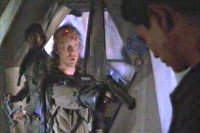 Choice or Chance
Choice or Chance

Written by Steven Zito
Directed by Felix Alcala
Airdate 11/26/95
Now prisoners to AI mercenaries who are working with the Chigs, the 58th must escape with body and soul intact. West is confronted by a Chig soldier posing as a faux-Kylen (a returning Amanda Douge); Vansen and Damphousse are pitted against one another; Hawkes and McQueen attempt to use a disabled AI to contact the Saratoga; and Doug Hutchison (The X-Files' Tooms) appears as a new AI foe, Elroy El 1327, who breaks Wang through torture, forcing him to admit to war crimes.
The exciting Chig bomber storyline begun in the last episode is abandoned in this second installment. Unfortunately, having Silicates as bad guys here feels anticlimactic following Hostile Visit. The AIs are certainly more menacing here than in previous episodes, but not necessarily more believable. Their one-note "take a chance" philosophy seems like a crutch, an artifice used to prop them up to seem more dimensional than they really are.
What's effective, however, is the use of the alien prison as a crucible, testing the 58th's mettle through exploiting each one's weakness. The series begins to explore truly dark psychological themes here. Wang's torture, particularly, is uncomfortable to watch, but his storyline broadens the character's scope further than in any episode to date. He even becomes the first member of the 58th to get romantic, albeit with unhappy results.
Actor Joel de la Fuente had wanted to see something more heroic from Wang since the pilot. "I admire Wang," he says. "He came in unprepared for what he eventually has to deal with. He doesn't have a strong reason to be a Marine. He joined because there wasn't going to be any more war, and he wanted to finish his education. He came from an underprivileged background and the fact that he stuck around and adapted to things says something about him."
As in the previous episode, production designer Bernard Hides was unhappy in the results of the alien sets his team had designed. "I was disappointed that the D.P. didn't use the lighting effects that were possible in this set," he says. "The material along the top and the sides of it was transparent. so that the light could come through from behind, giving it a translucent, kind of alien, quality. But it was lighted very dark, and none of that showed through at all. I thought it was too bad."
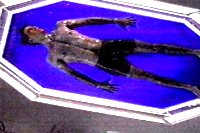 Stay With the Dead
Stay With the Dead



Written by Matt Kiene and Joe Reinkemeyer
Directed by Thomas Wright
Airdate 12/3/95
A fierce battle with the aliens has left the rest of the 58th apparently dead, but Nathan insists they're still alive. He must convince McQueen he's right before a bizarre form of psychosurgery removes his memory of them forever.
"This was a definite turning point for my character," says actor Morgan Weisser, "finally having a whole piece of material that I had to rise to the occasion to deliver."
Indeed, Kiene and Reinkemeyer's script is the first to present West as hero, rather than love-lorn loser, in a script that delivers real jolts and exciting suspense.
Says Reinkemeyer, "Glen and Jim had suggested something to us from their X-Files days, which was starting a story by asking yourself, "What's a startling moment?" In the case of Stay With the Dead, Nathan's coming back from a battle and everyone else is dead. And that's the teaser. Wow. How do you get out of that?"
An equally startling moment sees Nathan being placed in a bed of blue restraining gel, unable to resist the surgeons about to remove his memory.
"We were looking for what would be the 21st-century equivalent of a straitjacket," says Reinkemeyer. "A couple years ago, I had a rat loose in my house, and the landlord put out this mousetrap, which wasn't the normal snap-over kind. It was a little plastic tray with sticky gel, and the rat gets in there and gets stuck. They don't die right away, so you have to pick it up. It was the most horrifying thing ever."
"They sort of fashioned it after Jacob's Ladder," says Weisser, "in that there's no chronological time. It moves into reality, hallucination and back and forth in time, so the audience's head is swimming just like the character's is."
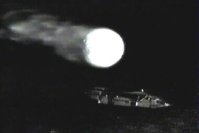 River of Stars
River of Stars



Written by Marilyn Osborn
Directed by Thomas Wright
Airdate 12/17/95
The 58th's Christmas celebrations are curtailed when their ship is crippled, left to drift out of control in empty space, until a miraculous circumstance occurs that offers them renewed hope.
Apollo 13 with a spiritual undercurrent, River of Stars is Marilyn Osborn's moving character study that marries scientific rationalism with religious faith in a story that's sentimental without ever venturing into the maudlin.
"The whole genesis was Glen had been reading an article that was offering various scientific explanations for the Star of Bethlehem that the Wise Men had followed," says Osborn.
"He brought it to me and said, why don't we come up with something interesting for Christmas about this."
Osborn also welcomed the chance to bring a spiritual dimension to the often too-intellectualized science fiction genre. "I think sometimes there's a dryness and a distance in other science fiction shows, but one thing we try to do here is address the issue of faith and spirituality. I think the whole thing was about faith."
"That's what I love about this show, is that we can get into the poetry of the human condition, as well as the science and the action. It's the most interesting show I've ever worked on. Each episode is like its own world with its own theme, it own tone, and what a wonderful challenge that is for a television writer."
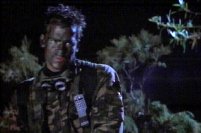 Who Monitors the Birds?
Who Monitors the Birds?



Written by Glen Morgan and James Wong
Directed by Winrich Kolbe
Airdate 1/7/96
Cooper is offered an honorable discharge from the Marines in exchange for his services in a dangerous commando mission.
Who Monitors the Birds? was the most experimental episode of the season, a show told primarily through visuals, with less than 15 minutes of dialogue in the entire hour. The episode, confidently directed by Star Trek veteran Rick Kolbe, also unravels Cooper's backstory through a moving series of flashbacks, then takes a metaphysical bent when, exhausted and alone, he's visited by a strange apparition, the Whore of Death, who, in an interesting casting twist, is played by series regular Kristen Cloke.
I'd point this out as the series' finest episode, except for a minor, unavoidable quibble: the lack of involvement from the other series regulars. The show really does work best when the entire ensemble is employed. But for actor Rodney Rowland, it's an extraordinary showcase, and perhaps not unbiased, he says, "I think it's the best hour I've ever seen on TV."
"For an actor, it's one of the most unique things I could have done," he adds. "When they really write my character, there are aspects I get to play that you couldn't find in any other character. There's nothing cliched about him. He's a six-year-old twenty-four-year-old."
 Level of Necessity
Level of Necessity


Written by Matt Kiene and Joe Reinkemeyer
Directed by Thomas J. Wright
Airdate 1/14/96
The series here explores a phenomenon reported by Vietnam soldiers: experiencing precognitive visions while in the heat of battle. Here, Damphousse begins having these strange premonitions, and suddenly a representative from the military wants to recruit her into a covert squad to take advantage of her newly displayed abilities. Richard Kind (Mad About You) plays Colonel Burke.
Damphousse finally gets the spotlight in this episode, and while in some ways the storyline feels merely tacked on to her character, in other ways, it makes sense. Damphousse has, throughout the season, been painted as the member of the squadron with the greatest emotional empathy. Why not extend this empathy to the level of actual psychic insight?
Says writer Matt Reinkemeyer, "I think the other characters had been explored, and the one person we knew least about was Damphousse. Since she had always been played as a fairly emotional person, Glen felt that she was a real candidate to have this emotional experience."
Richard Kind as Burke becomes a kind of Obi-Wan Kenobi to Damphousse and her flowering abilities, but is he playing on the dark side? The writers wanted to keep that ambiguous.
"The way we'd come up with the idea was swiping from Macbeth," says Matt Kiene. "In the beginning, Macbeth meets with the Three Witches, and they predict certain things for him, and then that prediction drives his behavior for the rest of the play.
"So we thought, let's have Damphousse get the knowledge that someone is going to die. How does she deal with that? Does she tell? Will they think that she's nutty? Does she have a responsibility to say anything?"
Actress Lanei Chapman was happy to see Damphousse finally get an "A"-storyline, but was surprised about its content. "We're constantly thrown curves," she says. "I'd spoken with Glen about the development of Damphousse as the one with the heart, and he said, 'Yeah, I think of her as being a little more mature,' and in that maybe a little more reserved, but I had no clue that that meant she had this kind of special awareness."
Although it was never overtly explained, that "special awareness" didn't extend beyond this episode. "We've decided it was something specific to that planet, so it's not something we'll necessarily continue," says Chapman. "That's the explanation for why it hasn't been brought up again. It would get a little repetitive if she could simply predict every time they would be in danger."
Note: "Matt Rienkemeyer" is a mistake by Mr. Stevens.
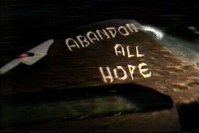 Never No More
Never No More



Written by Glen Morgan and James Wong
Directed by James Charleston
Airdate 2/4/96
Another two-part episode for the series. In this installment, an advanced Chig fighter ship, whose unseen pilot is dubbed Chiggy von Richtofen, is giving Earth's forces a drubbing. Meanwhile, Shane is reunited with a fighter pilot she once almost married.
The episode's title is derived from a Patsy Cline tune Shane plays over and again on the Tun Tavern's jukebox. Vansen, whose character has often been criticized by fans for being "too harsh," is softened considerably in this episode, as she takes center stage in a wistful, romantic storyline.
One of the continued strengths of the series is its ability to take well-worn, even archetypal stories from the combat and western genres, and make them fresh by telling them through the prism of Space's likeable, complex characters. Such is the case here: the storyline is simple, the situations familiar, but because the characters are multi-dimensional, the events take on a unique life.
While the events are told through the crucible of war, actress Kristen Cloke believes the war can also be read as a metaphor for anyone's life situation. "It was the story of a romance," she says. "You fall in love with somebody who could die at any moment. You're always trying to fight the inevitable. McQueen says there has to be something beyond this war, and I think it's human nature to believe that. It's imperative to believe that."
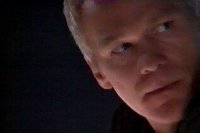 The Angriest Angel
The Angriest Angel



Written by Glen Morgan and James Wong
Directed by Henri Safran
Airdate 2/11/96
McQueen as Shane, as the character takes up the challenge of Chiggy von Richtofen. The mysterious, elusive McQueen has become a favorite over the course of the season, and here he steps into the twelve o'clock sun in an episode that fits more easily into the old-style Western archetype than in Morgan and Wong's World War II paradigm. It's a rip-roaring, satisfying shoot 'em up.
The AeroTech subplot, driven by Michael Mantell's Sewell, is seemingly brought to a close here, as Sewell dies in a mysterious accident, paving the way for McQueen's last-ditch offensive against Chiggy von Richtofen.
"The Angriest Angel" definitely reminded me of a Western," says actor James Morrison. "It was a great story of personal redemption. The good-guy takes out the bad guy against all odds. It's ultimate fantasy stuff."
Morrison had discussed with Glen Morgan and James Song ways to further define McQueen's character, and saw the fruits of those discussions revealed in these episodes. "Glen and Jim learn a lot from me about the character, I think, and I learn a lot from them - the way that the other characters relate to McQueen, the fact that I was married once, the books that I read, the interests that I have, what you learn about him from seeing his quarters, things like that. It's a great give-and-take relationship."
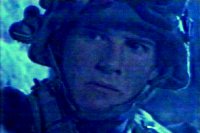 Toy Soldiers
Toy Soldiers



Written by Marilyn Osborn
Directed by Stephen Posey
Airdate 2/18/96
Nathan discovers that his younger brother (played here by Marc Warden) has enlisted in the Marines when Neil's infantry unit turns up on the Saratoga. Hardened by his experiences, Nathan tries to shield his brother from the realities of war, but Neil is caught under the spell of his unit's charismatic but foolhardy lieutenant, and pays for that mistake with his life.
Marilyn Osborn's meditation on Stephen Crane's The Red Badge of Courage began with Morgan and Wong's desire to revisit Nathan's brother Neil, and perhaps use that character to contrast a new recruit's naivete with a veteran's growing cynicism. It's a nicely wrought portrait of the relationship between brothers, fraught with competitiveness, tinged by love.
Flashbacks detail Nathan's childhood memories, and also serve to offset the harsh notes the character hits throughout the script. "I came across as a sort of selfish jerk in some of those scenes," says Morgan Weisser. "But that makes it so much more poignant at the end."
"I re-read The Red Badge of Courage," says Osborn, "and it was a story that took place in the Civil War but had such a classic theme. And by introducing Neil's lieutenant, it allowed the story to work on two levels. It's a story about brothers, and it's also a story about how foolish the loss of life is. It was a very emotional thing to write."
Osborn says the decision to kill Neil in the episode's climax was not made in the beginning, but rather evolved as the script did. "It's a downer, but it's also the truth in war," she says.
The episode opens each act with a literary quotation that embodies the theme of that particular segment.
"I had taken those throughout my re-reading of The Red Badge," says Osborn. "It kept the focus going for me as I was writing each act. The intention was to elevate the story. I wanted this to have a classical feel to it. The setting could really have been the Civil War."
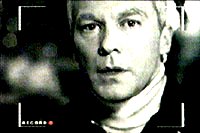 Dear Earth
Dear Earth


Written by Richard Whitley
Directed by Winrich Kolbe
Airdate 3/10/96
This character-centered, off-format story revolves around the after-effects of a mail shipment from Earth. Damphousse gets a "Dear Jane" missive from her fiance, Shane learns her sister is pregnant and Nathan receives a letter from his parents and he realizes they haven't been notified of Neil's death. And McQueen and Hawkes are invited to participate in a documentary about in vitros in the military.
One of the best hours of the season, Dear Earth has practically no SF elements beyond the inherent premise of the series. Some might argue that makes it weak science fiction. Perhaps, but it remains great drama.
Lanei Chapman reveals there was an additional scene in Damphousse's storyline which was cut for time. "At the end of the episode, I actually wrote a letter to him in which I was breaking up with him first. I was going to pre-date this and I was pretty vicious in it. At the last minute, I decide not to send it. I missed that closure in the final version of the episode."
Cooper's arc in the episode reveals his awkwardness and vulnerability in the face of the barely masked prejudice aboard the Saratoga. Rodney Rowland says there was some reluctance about it.
"The network was afraid to see that," he says. "They wanted to keep Cooper cool, and I said, let McQueen play the evolved tank. Let me show Cooper's weak side, his goofiness. I wanted to see all those sides of the character."
In the episode's conclusion, Vansen is promoted to captain. Actress Kristen Cloke had a curious reaction to the scene. "Every time I read that scene, I cried," she says, "because I know her so well. I know what that moment means to her. She's very vulnerable, and very susceptible to the pain of the people that she really loves. She's a very complicated, sad person. She's much sadder than I am as a person. But as a leader, I think that gives her a little more dimension."
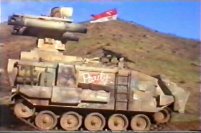 Pearly
Pearly

Written by Richard Whitley
Directed by Charles Martin Smith
Airdate 3/24/96
The 58th discovers a British Major, Cyril MacKendrick (Martin Jarvis), deserted on a world controlled by the Chigs and begin to suspect he may be working with the enemy.
Comic Adam Goldberg, Kimberly Patton and Doug Hutchison appear as Silicates who promise Wang they'll erase his war crimes confession (obtained in Choice or Chance) in return for a critical power cell needed by the 58th to get home.
Pearly is a disappointing outing, extremely digestive in nature, with seemingly endless scenes of the episode's namesake, an armored tank commandeered by the 58th, rolling over identical desert terrain. I suppose the cost of obtaining the tank was so great that the producers felt they'd better make the most of the costly prop.
The episode's salvation lies in its resolution of Wang's subplot. The character's guilt over the events in Choice or Chance had re-surfaced periodically, and the conclusion of that story thread here is cathartic and satisfying - although I'm still no fonder of the AIs as villains.
Says actor Joel de la Fuente, "I'd still like to see more of a backstory for Lanei's character and mine. I do make up things about Wang for my own use when I have need for them, but I frequently have to edit those, because as you get a new script in, there's a little more filled in each time. But it's been a real challenge to sort of re-define my character as we go along. He was a very timid, untested guy when he first came into this war. He's not anymore."
 R & R
R & R


Written by Jule Selbo
Directed by Thomas J. Wright
Airdate 4/12/96
The 58th gets some much-deserved rest and recreation aboard a space station pleasure palace. It's a good thing this episode got placed on a Friday night at eight, in a crucial two-week try-out. How would Sunday's seven o'clock audience have handled Cooper's pill addiction (to "green meanies") or West's hiring a prostitute to "be good" to the virginal in-vitro?
Rap star Coolio guest stars in a brief scene as host of the Bacchus station, but the real piece of stunt casting is The X-Files' David Duchovny as an AI pool shark attempting to hustle Shane, in more ways than one.
Glen Morgan says Duchovny agreed to the cameo, "because he felt like he owed us from our time on The X-Files." But he was only willing to do it under the conditions that he receive no credit [and] the appearance not be promoted.
In addition, the producers figured out how best to use the Silicates. They're not threatening Borg-like baddies; they're comic foils for the series leads.
Another semi-The X-Files connection: McQueen orders up some W.C. Fields movies while on the Bacchus, including one that's directed by Clyde Bruckman, who shares the name with Peter Boyle's character in The X-Files' episode Clyde Bruckman's Final Repose, which was written by Glen Morgan's younger brother Darin.
Production designer Bernard Hides got whimsical with the designs for the Bacchus. "It's Las Vegas," he says, "with a beam of light shooting out into space like the Luxor's, and the brilliant lights from the strip, that sort of thing."
 Stardust
Stardust

Written by Howard Grigsby
Directed by Jesus Trevino
Airdate 4/19/96
In the second of two heavily promoted episodes that aired on Friday night, Gail O'Grady (NYPD Blue) appears as a Colonel brought in to carry out a crucial mission that involves the 58th.
The episode's historical parallel is a British intelligence operation prior to D-Day that placed fake plans on the person of a corpse, who was dressed as a high-ranking officer and dumped in the Channel. This led Hitler to deploy troops away from the Normandy beaches where the invasion actually was to take place.
There's another World War II analogy used here, involving the use of a Navajo code. Strangely, this obscure historical story was also a plot device in The X-Files early this season.
The theme of this intricately plotted episode is that every individual has within him the capacity to be heroic. In many ways, this is the point of the entire series. Events must simply unfold that brings the hero to the forefront.
Glen Morgan recalls the shooting of a scene between star Rodney Rowland and guest Gail O'Grady. "Rodney's grown so much as an actor, it's amazing," says Morgan. "If anything, he thinks through things too much. He was about to do a scene with Gail O'Grady, and he came in my office and wanted to talk about it. He was going 'round and 'round with it, when all of a sudden, without any prodding, he got the answer all on his own. He just needed to trust his instincts."
The scene had a flirtatious subtext that Rowland was trying to reveal. "He doesn't know the first thing about talking to a girl, relating to a girl on that level," the actor says. "He can't even figure out what he's feeling in a lot of ways. I think for that reason, he's really a tragic character."
 Sugar Dirt
Sugar Dirt



Written by Matt Kiene and Joe Reinkemeyer
Directed by Thomas J. Wright
Airdate 4/20/96
As the groundwork continues for Operation Roundhammer, Earth's D-Day-style offensive, the 58th find themselves sacrifices as pawns to the larger war effort.
Amazing visual effects from Area 51 highlight a ground assault that precedes the squadron being deserted by the Saratoga. The carrier joins the Earth fleet in attacking a target even more important to the war effort than the objective the 58th is sacrificed to obtain. At the very last moment, McQueen bursts through a pair of double doors, John Wayne-like, to rescue his comrades.
"It's loosely based on the memories of those who fought at Guadalcanal," says writer Matt Kiene. "It shows the really desperate situation of the people who fight this battle versus the people who make decisions about the war." "One of the things that the episode tries to do is give you a sense of the broader war," says Joe Reinkemeyer, "so there are a lot of scenes with our equivalent of the supreme allied command, where they're plotting strategies. They don't really have contact with our regulars, the 58th, and we see that the 58th is just really one sprocket of the big war machine. You get the feeling that in certain circumstances, yes, they could be expendable. There are forces outside the 58th's control. And we can explore how the 58th responds to this."
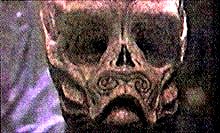 And If They Lay Us To Rest...
And If They Lay Us To Rest...


Written by Glen Morgan and James Wong
Directed by Vern Gillum
Airdate May 26, 1996
The 58th are sent to gather intelligence on a tiny moon of the Chig homeworld - the target of Operation Roundhammer. However, the squadron encounters a vulnerable alien creature on the moon, which they believe to be of an innocent alien species about to be decimated by Roundhammer. To save the creature, and the alien hatchlings it is protecting, the 58th inform it of the offensive that's about to be launched.
As the episode ends, a Chig ambassador arrives at the Saratoga, offering a peace proposal. We see that the creature the 58th has encountered is, in fact, a Chig.
Note: the title of this episode is misprinted; the correct title is And If They Lay Us Down To Rest...
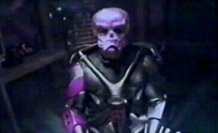 ...Tell Our Moms We Done
Our Best
...Tell Our Moms We Done
Our Best



Written by Glen Morgan and James Wong
Directed by Thomas Wright
Airdate June 2, 1996
Earth continues peace talks with the Chigs, and the surviving Tellus and Vesta colonists (including Kylen) are freed as an act of good faith. During the talks, the Chig ambassador reveals that AeroTech was warned the Chigs considered the Vesta and Tellus colonies their territory, but sent the Earth colony ships anyway. Furthermore, AeroTech also knew of a crucial connection between life on Earth and on the Chig homeworld - both are derived from early amino acids originating on Earth.
The Chig ambassador detonates a bomb, killing the Chief Executive Officer of AeroTech, E. Alan Wayne, and maiming McQueen, just as the Earth forces realize the implications of the 58th's actions on the Chig moon. The 58th are launched to protect the returning Earth colonists, and in the ensuing battle, Vansen, Wang, and Damphousse are lost and presumed dead. West and Kylen have an awkward reunion, but are parted again soon after when Kylen leaves for Earth.
As the episode ends, West and Cooper are alone in the 58th's bunk room, still dealing with the aftereffects of their loss...
All site graphics, original texts, and content other than specified © DrkNite. Fan art, fan photos, and other contributed materials © to their respective owners. All rights reserved.